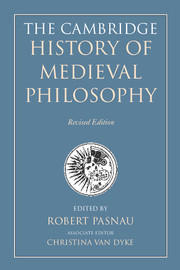Book contents
- Frontmatter
- Contents of Volume 1
- Preface
- List of contributors
- Frontmatter
- Contents of Volume 2
- Introduction
- I Fundamentals
- 1 Origins in baghdad
- 2 The emergence of medieval latin philosophy
- 3 Byzantium
- 4 The rise of the universities
- 5 Monks and friars
- 6 Platonism
- 7 Augustinianism
- 8 Censorship*
- 9 Modernity
- II Logic and language
- III Natural philosophy
- IV Soul and knowledge
- V Will and desire
- VI Ethics
- VII Political philosophy
- VIII Metaphysics
- IX Theology
- Appendices
- Bibliography of primary sources
- Bibliography of secondary sources
- Index nominum
- Index rerum
- References
3 - Byzantium
from I - Fundamentals
Published online by Cambridge University Press: 05 August 2014
- Frontmatter
- Contents of Volume 1
- Preface
- List of contributors
- Frontmatter
- Contents of Volume 2
- Introduction
- I Fundamentals
- 1 Origins in baghdad
- 2 The emergence of medieval latin philosophy
- 3 Byzantium
- 4 The rise of the universities
- 5 Monks and friars
- 6 Platonism
- 7 Augustinianism
- 8 Censorship*
- 9 Modernity
- II Logic and language
- III Natural philosophy
- IV Soul and knowledge
- V Will and desire
- VI Ethics
- VII Political philosophy
- VIII Metaphysics
- IX Theology
- Appendices
- Bibliography of primary sources
- Bibliography of secondary sources
- Index nominum
- Index rerum
- References
Summary
PHILOSOPHY IN BYZANTIUM
The Greek-speaking scholars of Byzantium – the eastern part of the Roman Empire, which was not devastated in the fifth century by barbarian invasions – have often been praised for their diligence in copying a great number of ancient philosophical texts, thus making an invaluable contribution towards the preservation and transmission of these texts for the generations to come. It is more often than not overlooked, however, that in Byzantium the works of ancient philosophers were arduously copied in order to be closely studied, commented on, and otherwise used for educational purposes. There is ample evidence that, at least from the ninth century to the fall of Constantinople in 1453, the Byzantines seriously engaged in a fervent dialogue with the different ancient philosophical traditions. This dialogue resulted in the composition of many philosophical works that belong to various genres of philosophical writing, including paraphrases, extended commentaries, commentaries in question-and-answer form, small handbooks, treatises on specific topics (sometimes in dialogue form), and letters and orations with philosophical content.
Though philosophy in Byzantium was undoubtedly influenced by ancient Greek philosophical doctrines – which, after all, provided the Byzantines with both a well-articulated theoretical framework and a sophisticated philosophical language – its character could not but also be influenced by the Christian faith in which the Byzantine thinkers were deeply immersed. For they read and criticized the ancient philosophical texts in the light of their Christian beliefs and with the purpose of either rejecting pagan views or trying to incorporate them into their Christian outlook. Indeed, the connection between Byzantine philosophical works and theology is admittedly so strong that in recent years it has constituted the basis for seriously questioning the autonomy of Byzantine philosophy.
- Type
- Chapter
- Information
- The Cambridge History of Medieval Philosophy , pp. 39 - 49Publisher: Cambridge University PressPrint publication year: 2014

